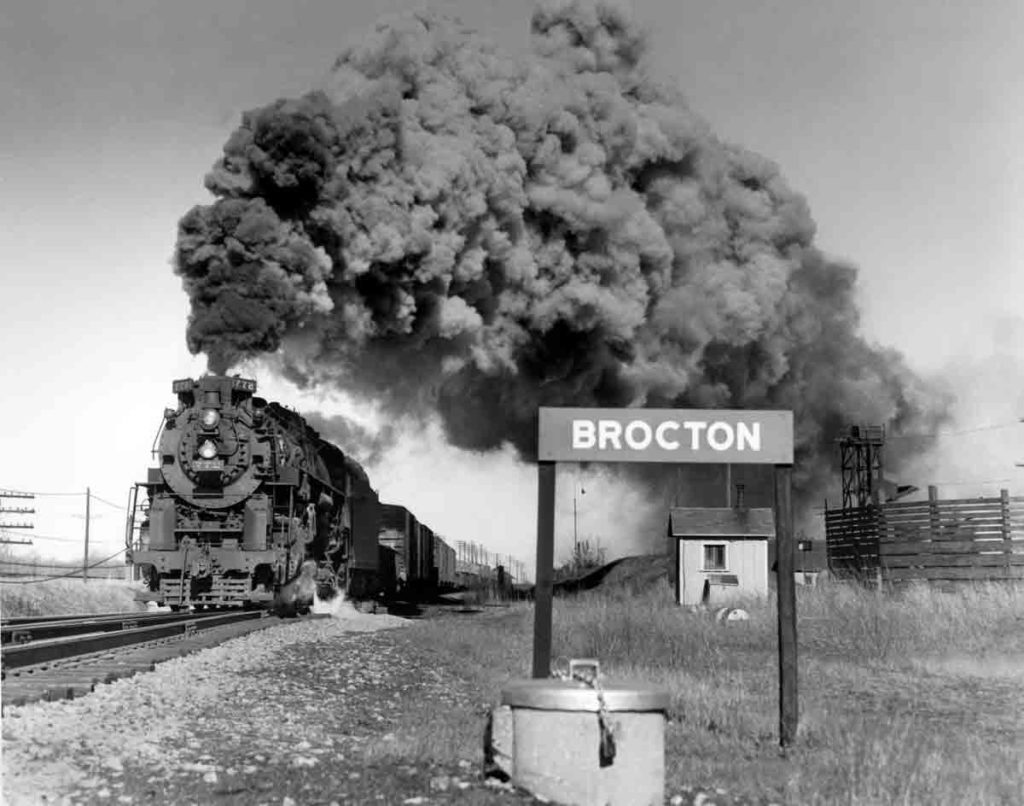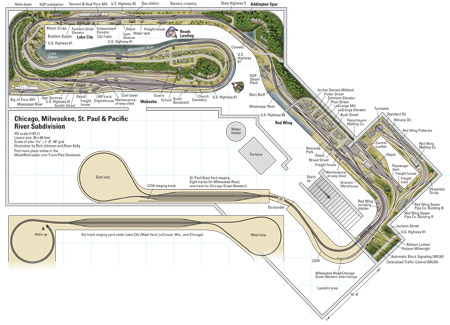
Name: Chicago, Milwaukee, St. Paul & Pacific River Subdivision Scale: HO (1:87.1) Size: 30 x 60 feet Locale: Eastern Minnesota along the Mississippi River Period: Early fall 1950 Style: walkaround Mainline run: 195 feet (per westbound and eastbound tracks) Minimum radius: 36″ Minimum turnout: no. 6 Maximum grade: 2 percent (in helix) Benchwork: L girder, […]
Read More…
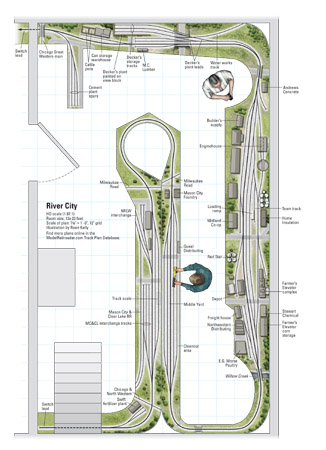
Name: River City Scale: HO (1:87.1) Size: 13 x 23 feet Prototype: Minneapolis & St. Louis Ry. Locale: Mason City, Iowa Period: first week of May 1954 Style: walkaround Mainline run: 90 feet Minimum radius: 18″ Minimum turnout: no. 5 Maximum grade: none Benchwork: open frame Height: 42″ Roadbed: Homasote on plywood Track: Peco code […]
Read More…

Name: Nickel Plate Road, Kentucky Western Division and Canandaigua Southern RR, Southern Division Scale: O (1:48) Size: 18 x 89 feet Prototype: Nickel Plate Road and freelanced Locale: southern Ohio and western Pennsylvania Period: May 1958 Style: walk-in Mainline run: 1,000 feet Minimum radius: 64″ (main line), 56″ (staging loops) Maximum grade: 2.5 percent Benchwork: […]
Read More…
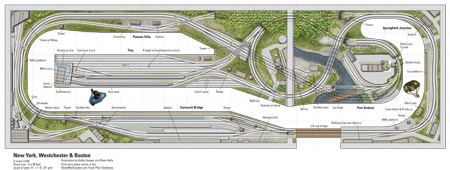
Name: New York, Westchester & Boston Scale: S (1:64) Size: 12 x 39 feet Prototype: alternate history New York, Westchester & Boston Locale: New England Period: 1955 Style: around-the-walls with peninsula Mainline run: 120 feet Minimum radius: 42″ (visible), 36″ (hidden) Minimum turnout: no. 6 Maximum grade: 2.5 percent (main), 3 percent (branch), 4 percent (down […]
Read More…

Name: New England, Berkshire & Western RR Scale: HO (1:87.1) Size: 33 x 124 feet Prototype: freelanced, inspired by Delaware & Hudson and Rutland Locale: upstate New York and western Vermont Era: 1950 Style: linear walkaround Benchwork: L-girder Height: 51″ to 59″ Roadbed: 1⁄2″ Homasote with molded wood putty shoulders on 3⁄4″ plywood Track: handlaid […]
Read More…
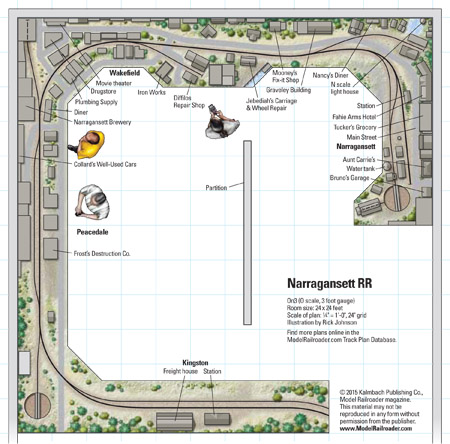
Name: Narragansett RR Scale: On3 (O scale, 3-foot gauge) Size: 24 x 24 feet Prototype: freelanced, inspired by Narragansett Pier RR Locale: Narragansett, R.I. Era: 1950 Style: walk-in Mainline run: 78 feet Minimum radius: 28″ Minimum turnout: no. 6 Maximum grade: none Benchwork: L-girder and tabletop Height: 601⁄2″ Roadbed: Homasote on spline subroadbed Track: handlaid […]
Read More…
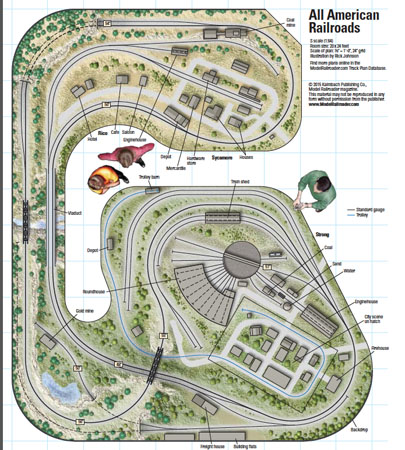
Name: All American Railroads Scale: S (1:64) Size: 20 x 24 feet Theme: freelanced Locale: generic North America Era: 1950s Style: walk-in Mainline run: 116 feet Minimum radius: 42″ Minimum turnout: no. 8 Maximum grade: 1.5 percent Benchwork: open grid Height: 42″ Roadbed: cork on plywood Track: Shinohara code 100 Scenery: drywall compound over extruded-foam insulation board […]
Read More…
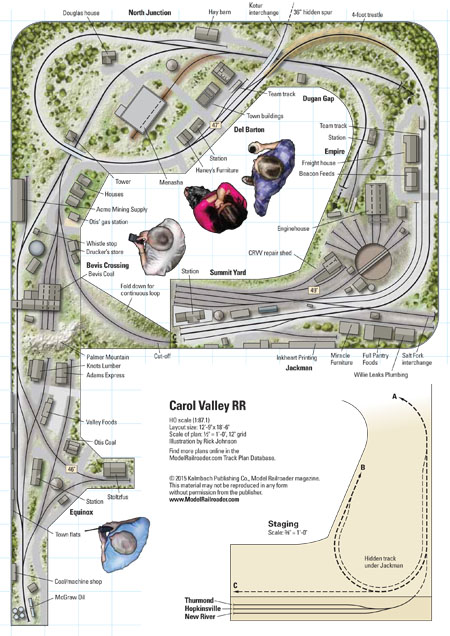
Name: Carol Valley RR Scale: HO (1:87.1) Size: 12′-9″ x 18′-6″ Prototype: freelanced subsidiary of Baltimore & Ohio Locale: West Virginia Era: early 1950s Style: around the walls with dropdown Mainline run: 70 feet point-to-point, 98 feet with continuous run Minimum radius: 20″ Minimum turnout: no. 4 Maximum grade: 2 percent Benchwork: open grid, L-girder, […]
Read More…
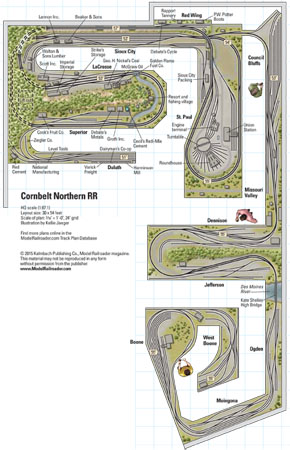
Name: Cornbelt Northern RR Scale: HO (1:87.1) Size: 30 x 54 feet Prototype: freelanced, inspired by Chicago & North Western, Great Northern, and Milwaukee Road Locale: upper Midwest Era: early 1950s Style: around the walls Mainline run: 215 feet Minimum radius: 36″ Minimum turnout: no. 6 Maximum grade: 2 percent Height: 51″ to 57″ Roadbed: […]
Read More…







